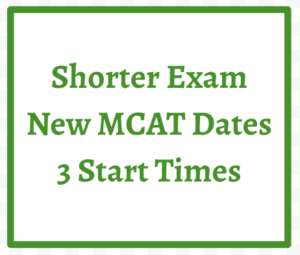 The 2020 MCAT is now a shorter exam, offered 3 times a day as per today’s (24 April 2020) AAMC update.
The 2020 MCAT is now a shorter exam, offered 3 times a day as per today’s (24 April 2020) AAMC update.
Following March, April and May MCAT test date cancellations, the AAMC has released a bombshell of an update with regards to the 2020 MCAT.
To see a timing and pacing strategy Click Here
Let’s review what they posted and figure out what it means.
Since this is new I can only share what I know so far, but I promise to update you as soon as I learn and work through new information through my MCAT Email Newsletter.
Here’s what we know so far (other than their site immediately went down for maintenance after this announcement.)
Registration Will Open on May 7th
I suspect that they had just barely come to this agreement when the information posted,
and that they’ll need time to officially make this happen. This is a silver lining!
By giving you 2 weeks to process the information,
you can carefully evaluate your schedule and timeline
and make a strategic decision rather than just grabbing
any test date in a panic.
3 New Test Dates Added
The AAMC has added a whopping total of THREE new test dates to the 2020 calendar.
This may not be the final addition.
Back in 2014, when they switched from a 3.5 to 7.5hr exam they added a few ‘final’ test dates.
However, after lots of complaining, they added even more dates outside the standard testing schedule for December and January of that cycle.
New MCAT Dates
- June 28 – perfect for students who are finishing up with phase 2
- September 27
- September 28
The new September dates are scheduled for 2 weeks AFTER the former end of the 2020 testing cycle (Sep 12).
3 Start Times for the Shortened MCAT!
This is half the bombshell!
“Exams will be held three times per day on all test dates for the remainder of 2020. Standard start times will be 6:30am, 12:15pm, 6:00 pm each day. There may be some variations by test center…”
That’s
- 6:30 am
- 12:15 pm
- 6:00 pm
The old MCAT was administered in the morning and afternoon.
In an effort to accommodate so many students, the shortened (below) 2020 MCAT will have 3 different start times.
I assume this is to allow fewer students into the test center at a time,
safe social distancing during the exam and breaks,
and time to sanitize the testing center in between testers.
What does this mean for your studying?
I don’t recommend changing up your study schedule just yet,
or at all, while you’re in Phase 1 (content/foundation) and Phase 2 (practice).
During Phase 3, I advise students to begin waking up early and taking full -lengths at 8am.
Given the new start times I advise adjusting your Phase 3 study schedule accordingly.
Consider this:
IF you’re scheduled to test at 6:30 am,
you should use this wake-up strategy.
Figure out your schedule by backtracking.
IF you’re testing at 6:30 am, aim to arrive by 6am.
How will you get there?
What time do you have to wake up so you can shower, eat, get your stuff together, have coffee…?
IF you’re testing at 12:15 DO NOT get up early.
Aim to sleep in a little and be well rested.
Maybe even add an easy workout (yoga, walk) in the morning to jumpstart your brain and help you relax.
ONLY sign up for a 6pm exam if you’re a night-person and KNOW that you won’t pass out on the P/S section when it’s already dark out.
And now for the BOMBSHELL announcement…
The Shortened MCAT is now just 5 hours and 45 minutes
Yup, you read that correctly!!
The AAMC is shortening the MCAT from over 7 hours, down to 5:45!
Now before you rejoice, let’s take a look and see where they are cutting time in this exam.
“Some of the field test questions in each section have been removed, and some administrative items such as the tutorial and the end-of-day survey have been reduced or removed to shorten the length of the exam.”
Field test questions refer to experimental passages and questions that are NOT graded and therefore do not count towards your final MCAT scores.
Instead these are experimental questions to see how students respond so that they will know how to grade these very same questions in future exams.
If you look at the standard MCAT format you’ll see that there’s a 10 minute tutorial in the beginning, a survey, and more at the end.
I advise being so well prepared for your MCAT that you don’t need a tutorial on how to take the exam.
However, I do advise using whatever little extra time you have (during the tutorial) for a quick relaxation and meditation.
With a shorter exam, I urge you to do this BEFORE entering the test center
because you’re already going to be nervous as is.
That’s ok, it means you’re only human.
Just make sure you can snap out of it and focus!
“The exam will not be easier or harder than the full-length exam. You will still be tested on all 4 sections of the exam and are responsible for knowing the same concepts and skills covered on the full-length exam.”
Full breakdown of the new exam timings are below.
2 Weeks to Get Your Scores (rather than 30 days)
If you’re testing between Jun 19 and Aug 1st you won't have to wait the full 30 days for your scores.
Instead, they will be released approximately 2 weeks after your test date.
Rescheduling Fees Are Still Waived
The AAMC has waived all rescheduling fees until further notice.
This means if you want to register and cancel, or change your date, there are no associated fees.
This is both good news and bad.
Good in that you aren’t committed to anything,
but bad in that students are not encouraged to drop an undesired test date by the end of the Gold Zone.
I will be discussing this in detail as I learn more about this cycle and new testing formats.
Applications will be delayed as well
With individual schools now accepting primary (and maybe even secondary) applications prior to MCAT scores, many students are scrambling to complete their applications on time.
You now have an extra two weeks on this as well:
“AMCAS has also delayed transmitting applicant data to medical schools by two weeks (moving from June 26 to July 10) to give applicants more time to complete their applications.”
Shorter MCAT Sections Breakdown
So what does the shorter exam entail? Where did they cut time?
Section 1: Chemical and Physical Foundations of Biological Systems.
The Chem/Phys section was cut from 59 questions in 95 minutes
Down to: 48 questions in 76 minutes
10 minute break is unchanged
Section 2: Critical Analysis and Reasoning Skills aka CARS.
The CARS section was cut from 9 passages (53 questions) in 90 minutes
Down to: 48 questions in 81* minutes (*AAMC revised the originally stated 76 minutes to this new time)
Lunch break was cut from 30 minutes down to TEN
Section 3: Biological and Biochemical Foundations of Living Systems
The Bio/Biochem section was cut from 59 questions in 95 minutes
Down to: 48 questions in 76 minutes
10 minute break is unchanged
Section 4: Psychological, Social and Biological Foundations of Behavior.
The Psych/Soc section was cut from 59 questions in 95 minutes
Down to: 48 questions in 76 minutes
The void question was cut down from 5 to 2 minutes
Total ‘active test’ time: 5 hours and 15 minutes
Total seated time: approximately 5 hours and 45 minutes
First, take a moment to read through this carefully and process the changes.
Then, go back to your study plan and adapt.
Do not panic, do not stress over it.
Yes it’s different, yes it’s hard,
but you’re going to be a doctor.
You are resilient,
you will adapt,
and you WILL get through this.


